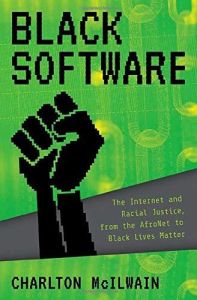Join getAbstract to access the summary!

Join getAbstract to access the summary!
Charlton McIlwain
Black Software
The Internet and Racial Justice, from the AfroNet to Black Lives Matter
Oxford UP, 2019
What's inside?
Today’s push for racial justice is rooted in Black America’s long relationship with computing technology and the internet.
Recommendation
The story of computing technology and the internet is one of white supremacy and the use of tech innovations to reinforce America’s bifurcated racial order. At the same time, it is the story of resistance to these new forms of oppression. Black Americans used these technologies to build community and wealth and to promote racial justice. Drawing on archival sources to tell the first-person stories of Black entrepreneurs, engineers, technicians and hobbyists, New York University professor Charlton McIlwain shows how Black Americans’ relationship with the computer revolution spans five decades, and laid the groundwork for the Black Lives Matter movement.
Summary
About the Author
Charlton McIlwain is professor of media, culture and communication at New York University.


















Comment on this summary